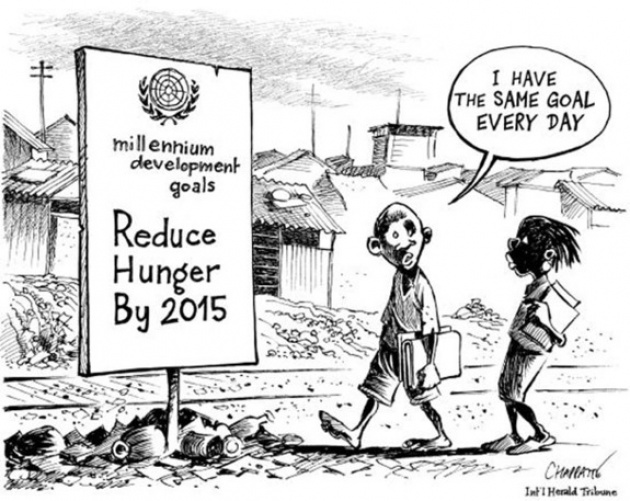
Education provides people with the bricks necessary to built homes of knowledge, confidence and competency. It's the ultimate investment in life, the investment that doesn't disappoint, collapse or expire. Unfortunately, not everybody has the the privilege and fortune to attend school, and for many causes - causes they can't control - they are unable to develop the potential they were given at birth. To my knowledge, there are five main reasons individuals find themselves missing the chance of getting an education.
1) They don't have enough food to survive, let alone having the energy and time availability to go to school. Many do attend school, but underperform because of chronic malnutrition. A recent study published by UK charity Save the Children has shown that malnourished children usually grow up smaller and weaker, and their brains often aren't able to develop fully. Here education takes a less urgent role, as individuals are fighting to stay alive. It's the case in many developing countries, and it should be addressed - and seriously discussed - by every political power on the planet. Some families resist education because they need their children to work in order to bring food on the table, so there are private organizations helping facilitate attendance, by offering to pay for children to go to school.

2) They have food, but lack schools. In many rural areas across the globe schools are located too far for many children to attend. In these circumstances getting an education it's more of a privilege, and the sacrifices that students - and their families - make for this to happen can be staggering. It's a problem with no easy solutions. Road systems are often poor, and many governments are short of resources to build additional schools for just a few kids. Because of the work of some private companies, the global figure for the number of children without access to schools has fallen to 57 million, the United Nations Educational, Scientific and Cultural Organization reports. However, there's still much to do to make that number disappear.
5832_fa_rszd.jpg)
3) They have food and schools, but lack basic supplies. Just because there is availability of buildings to host teachers and students, it doesn't mean they have access to textbooks, notebooks and writing utensils. This is when international charity organizations often make a difference. They even provide teachers, if needed.
4) They have food, schools, basic supplies, but lack computers and global connection. This is the 21st century, and being cut off from the rest of the world greatly limits the development of the young generation of this planet. Unless they build international relationships, they learn notions they can hardly put in practice, and instead of shaping their leadership they are relegated to the role of followers. Visionary companies such as Film Annex and the Afghan Citadel Software Company (ACSC) work to fill this gap. They just opened an Internet classroom in a school in Herat, the third largest city in Afghanistan, providing 1810 Afghan girls and boys with computers, curriculum and educational tools. Founded in 1961, Mirman Hayati High School is the 9th school reached by the generous hearts of Film Annex and ACSC, in their effort to improve the Afghanistan literacy rate and the education system in Afghanistan. Afghanistan schools need this type of help, and since education and economic growth go hand in hand, such opportunity can only increase the economy of Afghanistan. Afghanistan education can only benefit from this relationship, as these young Afghan women and men represent the future of Afghanistan.

5) They have all the above, but lack effort, driven attitude and passion: the "disease" of the children in "developed" countries. "I don't want to do this." "This is boring." "What's the point of this?" "I don't care." "This is stupid." "This is pointless." "I hate going to school." How many times have we heard kids say stuff like this? Some of these individuals are the next generation of world leaders, and as such, they represent our future. Even though I can't justify their attitude toward education, I can't help questioning the validity of our system. We tend to blame our youth of being sheltered and spoiled - and a little bit they are - but how much of that blame should be taken by an education system that is probably getting too outdated? What is the degree of responsibility the leaders of the present world should feel in order to revamp and improve the world of the leaders who will follow? What can be done to shake, motivate and inspire children to fully exploit the resources they are given, and help those who are less fortunate to do the same? If you know the answer, share it on social media, and start an educational revolution. :-)
Giacomo Cresti
http://www.filmannex.com/webtv/giacomo
follow me @ @giacomocresti76



